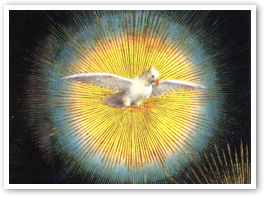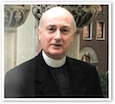He Makes All Things New
- FATHER GEORGE W. RUTLER
Religions contrived merely by humans tend to be exotic.
 But in the only actual instance of perfect divinity and perfect humanity united in an historical figure, Christ does not go about dressed as a wizard, and he tries to keep his miracles confidential: "Tell no one." He "makes all things new" (Revelation 21:5), but he does not make new things. Thus Aquinas wrote: "Grace does not destroy nature, but perfects it."
But in the only actual instance of perfect divinity and perfect humanity united in an historical figure, Christ does not go about dressed as a wizard, and he tries to keep his miracles confidential: "Tell no one." He "makes all things new" (Revelation 21:5), but he does not make new things. Thus Aquinas wrote: "Grace does not destroy nature, but perfects it."
In the Resurrection, the Lord goes to lengths to show that he is not a ghost, even to eating familiar food. In the Ascension, when he vanishes into what limited language could best describe as a cloud, two men in white soberly ask those whose mouths are agape: ". . . why are you standing there looking at the sky?" (Acts 1:11) For God — whose utterance "Let there be light," came billions of years before there was anyone to hear it — the Incarnation was, from the perspective of eternity, a holy mystery and not an artificial mystification.
On Pentecost, the apostles are not changed physically. They are changed into moral agents of God's power. Peter will have to tell Cornelius not to kneel before him because "I am only a man." Paul and Barnabas will have to disabuse the pagan priest and people of Lystra (in what now is Turkey) of the conceit that they are Hermes and Zeus. A few years before, no one in Capernaum thought that Peter was anything but a fisherman, and a year back no one wanted to sacrifice garlanded oxen to Paul and Barnabas.
Little more than a century after all this, an anonymous writer tried to explain Christians to a man named Diognetus. In one passage he says, "They do not inhabit cities of their own, use a particular way of speaking, nor lead a life marked by any curiosity." They marry and have children like everyone else, but they do not destroy their offspring, and they share their food, but not their spouses. It is in their ordinary way of life "that they display to us their wonderful and admittedly striking way of life." For Christians, "every foreign land is like a homeland to them, and every land of their birth is like a land of strangers." Here is grace at work on their nature: "They exist in the flesh, but they do not live by the flesh. They pass their days on earth, but they are citizens of heaven."
Stripped of its modern inventions, our culture is very like that in the fresh wake of Pentecost. Human nature is always the same, but grace can transform it without destroying it. Christians today, as back then, "are spoken ill of and yet are justified." And as Diognetus learned, those who hate them "are unable to give any reason for their hatred."
 This is Meaghen Gonzalez, Editor of CERC. I hope you appreciated this piece. We curate these articles especially for believers like you.
This is Meaghen Gonzalez, Editor of CERC. I hope you appreciated this piece. We curate these articles especially for believers like you.
Please show your appreciation by making a $3 donation. CERC is entirely reader supported.

Acknowledgement
 Father George W. Rutler. "He Makes All Things New." From the Pastor (May 17, 2015).
Father George W. Rutler. "He Makes All Things New." From the Pastor (May 17, 2015).
Reprinted with permission of Father George W. Rutler.
The Author
 Father George W. Rutler is the pastor of St. Michael's church in New York City. He has written many books, including: The Wit and Wisdom of Father George Rutler, The Stories of Hymns, Hints of Heaven: The Parables of Christ and What They Mean for You, Principalities and Powers: Spiritual Combat 1942-1943, Cloud of Witnesses — Dead People I Knew When They Were Alive, Coincidentally: Unserious Reflections on Trivial Connections, A Crisis of Saints: Essays on People and Principles, Brightest and Best, and Adam Danced: The Cross and the Seven Deadly Sins.
Father George W. Rutler is the pastor of St. Michael's church in New York City. He has written many books, including: The Wit and Wisdom of Father George Rutler, The Stories of Hymns, Hints of Heaven: The Parables of Christ and What They Mean for You, Principalities and Powers: Spiritual Combat 1942-1943, Cloud of Witnesses — Dead People I Knew When They Were Alive, Coincidentally: Unserious Reflections on Trivial Connections, A Crisis of Saints: Essays on People and Principles, Brightest and Best, and Adam Danced: The Cross and the Seven Deadly Sins.




